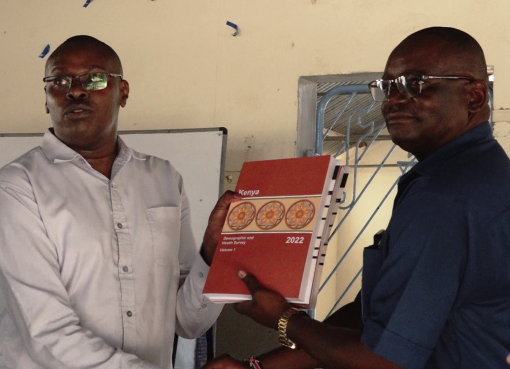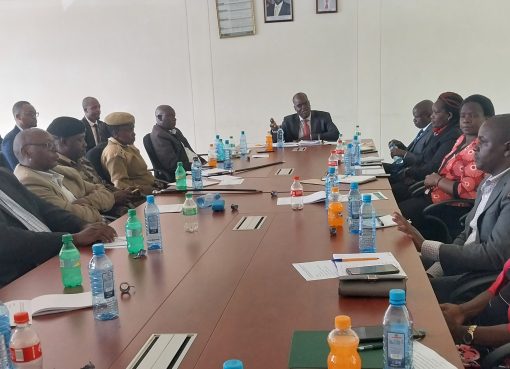In the heart of Githurai 45, Kiambu County, Mwihoko Dairy Goat Farm stands as a beacon of innovation in the agricultural sector.
Robert Macharia, a passionate dairy goat farmer with more than 13 years of experience, has made a significant impact in the competitive dairy production industry.
His farm was recognised as the best in Kenya during the ASK Nairobi Show held in October 2023 and the prestigious award presented to him by President William Ruto, highlighting the farm’s excellence and contributions to the sector.

Speaking exclusively to KNA, Macharia’s journey into goat farming began with a simple need of providing fresh milk for his family.
“What started as a personal endeavour has blossomed into a thriving business, driven by a growing demand for high-quality goat milk. Currently, the farm is home to over 86 goats, with 33 actively milking, producing around 80 litres of milk daily,” he said.
This impressive output, Macharia boasts, has been through meticulous planning and a commitment to quality, with customers required to place orders in advance to ensure freshness.
Embracing the principles for urban farming, Macharia explains to the KNA that he operates on a compact 40 by 60 plot, demonstrating that successful farming can be achieved even in limited spaces.
He said that the farm utilises smart techniques, focusing on high-quality feed and clean water to maintain the health and productivity of the goats, but also prioritises what their goats require, starting from the quality fodder that his goats feed on instead of just feeding to fill their stomachs, and this, he says, has enhanced production and minimised health risks.
“The farm’s primary customer base comprises individuals with specific health needs, including those suffering from arthritis, eczema, and lactose intolerance. Around 70 per cent of customers are under medication, drawn to the numerous benefits of goat milk, and this has seen the demand increase significantly.
Macharia notes that the farm is dedicated to educating others about dairy farming, and considering many still overlook the potential of dairy goat farmers, the farm is offering training sessions for a nominal fee of Ksh 2000 per person and provides consultancy services to those looking to establish their own operations.
Additionally, he says that the farm collaborates with various NGOs, including Operation Blessing in Kenya, the anonymous one, which is in Nyandarua, and the ACK Diocese of Mt. Kenya South (Anglican Church of Kenya), to promote agricultural initiatives among the youth.
His vision includes empowering disadvantaged individuals through farming education, and he tells KNA that they collaborate with several universities, such as Jomo Kenyatta University of Agriculture and Technology (JKUAT), Egerton University, and Eldoret University, who send their students to learn from the practices and innovations at the farm, further enhancing the organisation’s reputation and influence in the agricultural sector.

Despite the successes, Macharia candidly acknowledged the challenges he faced, particularly the scepticism from those around him when he transitioned from a stable job to farming.
“When I started doing this, I was facing a lot of discrimination from other people. It was part of the biggest challenges I ever went through,” he recounted. However, his determination and passion for agriculture propelled him forward, allowing him to turn adversity into opportunity.
He adds that many people still associate agriculture primarily with cows and chickens, creating a gap in the market for goat products and advocating for more farmers to consider dairy goats as a viable option.
Looking to the future, Macharia aims to expand his herd to between 500 and 1000 goats over the next five years, exploring opportunities for value-added products like cheese and pasteurization. “Education is key,” his advice to anyone interested in entering the industry. “Do your research, understand the breeds, and learn from experienced farmers.”
Eva Wanjiku, one of the workers at the farm and in charge at the management level, mentioned that they primarily breed three types of goats: the Toggenburg, Saanen, and Alpine. She noted, “We mainly import these breeds from South Africa and France, with each male alpine goat costing approximately Ksh 300, 000.”
Wanjiku emphasized that the goat’s milk is beneficial for boosting immunity and providing calcium to young children.
She explained that they feed the goats in the morning and evening after milking. “We currently have 200 bales of hay, which they use for their goats and also sell some. The pricing for ram varies, with those aged 3-6 months costing Ksh 15, 000, 7 to 10 months costing Ksh 25, 000, and those over one year priced at Ksh 30, 000,” she noted.
Anne Mumbi, a resident at Githurai 45, said that she is absolutely thrilled with the dairy goat farming at Mwihoko.
“The commitment to quality and sustainability is impressive, and I can see the positive impact Macharia’s farm is having on the community. I believe this venture has a bright future ahead.
Two months ago, the government established embryo transfer facilities and goat artificial insemination centres aimed at improving animal breeds in the country to boost farmers’ incomes.
The livestock sub-sector has been deploying modern agriculture risk management instruments such as crop and livestock insurance schemes and commodity market instruments, meant to ensure that farming was profitable.
By Geoffrey Muchemi





